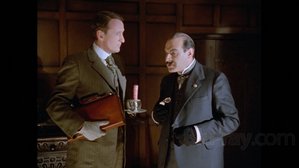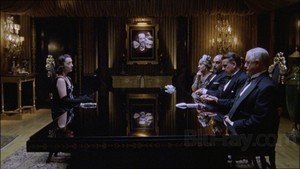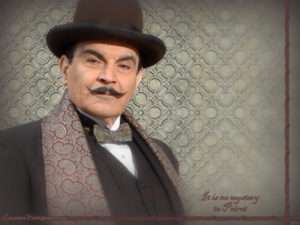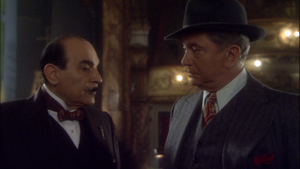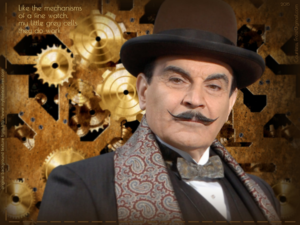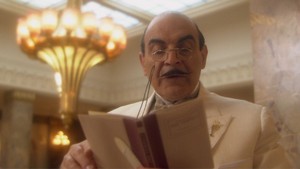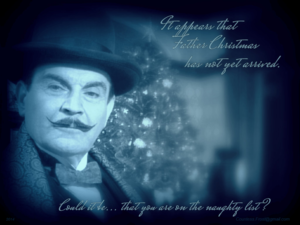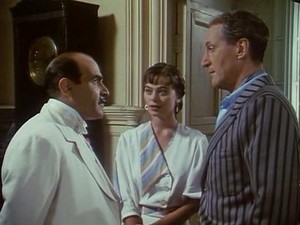"THE MYSTERIOUS AFFAIR AT STYLES" (1990) Review
As a long time reader of Agatha Christie's novels, I have been well aware of her first novel that was published in 1920, namely "The Mysterious Affair at Styles". I read the novel once. But if I must be honest, I never became a fan of it.
Due to my lackluster feelings for the novel, it took me a while to watch the television adaptation of it, which aired on ITV's "AGATHA CHRISTIE'S POIROT" back in 1990. But eventually I got around to it and was amazed to discover that it had been the second Christie novel to be adapted as a feature-length film on that series. Another amazing aspect of "THE MYSTERIOUS AFFAIR AT STYLES" is that it is the first of two or three episodes that was not set during the 1930s decade. In the case of this film, it was set in 1917, during World War I.
The movie opens in London with Captain Arthur Hastings on sick leave from military duty. Hastings seemed to be suffering from a mild case of post traumatic stress disorder. An encounter with an old friend named John Cavendish leads him to eagerly accept the latter's invitation to visit his family's estate - Styles - in Essex. During his visit, Hasting's meets John's family:
*Emily Inglethorp, John's wealthy stepmother and mistress of Styles
*Alfred Inglethorp, her much younger new husband, who is viewed as a fortune hunter
*Mary Cavendish, John's wife
*Lawrence Cavendish, John's younger brother
*Evelyn Howard, Mrs. Inglethorp's companion, who dislikes Mr. Inglethorp
*Cynthia Murdoch, the orphaned daughter of a family friend
Hastings also reunites with an old acquaintance he had met before the war - a Belgian detective named Hercule Poirot, who has become a war refugee. Due to Mrs. Inglethorp's generosity, Poirot has managed to find a place in the nearby village to harbor his fellow Belgian refugees in the area.
When the Styles Court's residents wake up to find Mrs. Inglethorp dying of strychnine poisoning, they learn from the local doctor that she had been murdered. Hastings recruits the help of Poirot to investigate the murder. They discover that John Cavendish will automatically inherit Styles Court upon his stepmother's death, due to being the estate's vested Remainderman. His brother Lawrence will also inherit a nice sum of money. However, the income left to Mrs. Inglethorp by the late Mr. Cavendish would be distributed, according to her will. However, Mrs. Inglethorp was heard arguing with a man about his infidelity - either her stepson John or her husband Alfred. She made a new will after the quarrel, but no one can find it. Two suspects would end up falling under the suspicions of the law before Poirot can reveal the murderer.
"THE MYSTERIOUS AFFAIR AT STYLES" is the kind of adaptation that most fans of Christie's novel absolutely adore. Due to Clive Exton's script, it is a detailed and nearly faithful adaptation of the novel. And for most moviegoers and television viewers these days, a faithful adaptation to a literary source is very important to the quality of a production. My view on the matter is a bit more ambiguous. It all depends on whether a faithful adaptation translate well to the movie or television screen. In the case of "THE MYSTERIOUS AFFAIR AT STYLES", I would say that Clive Exton's faithful adaptation served the story rather well. But the only reason I harbor this view is that I cannot think of a way how any change might serve the story. Because honestly? Christie's 1920 novel did not exactly rock my boat. And I can say the same about this television movie.
"THE MYSTERIOUS AFFAIR AT STYLES" is not a terrible story. It is a pretty solid tale that made it a little difficult for me to guess the murderer's identity. The story also featured mildly interesting characters that actually left me wondering about their fates. I especially found the stormy marriage between John and Mary Cavendish particularly interesting. And I also found myself scratching my head over Mrs. Inglethorp's marriage to the younger and obviously unlikable Alfred Inglethorp. I had originally assumed that this tale featured the first meeting between Poirot and Hastings. But as it turned out, the two men first met during a murder investigation in Belgium before the war. Pity. Come to think of it, "THE MYSTERIOUS AFFAIR AT STYLES" did not feature the first meeting between Poirot and Scotland Yard Inspector Japp. They had first met before the war, as well. But the story did feature the first meeting between Hastings and Japp.
Okay . . . look. "THE MYSTERIOUS AFFAIR AT STYLES" is a pretty solid story. It is filled with competent performances from the cast, including David Suchet, Hugh Fraser, and Philip Jackson as Poirot, Hastings and Japp. I was especially impressed by Gillian Barge as Emily Inglethorp, Michael Cronin as Alfred Inglethorp, Joanna McCallum. I was especially impressed by David Rintoul and Beatie Edney as the emotional John and Mary Cavendish. I do have to give kudos to production designer Rob Harris of his re-creation of World War I England and also costume designer Linda Mattock. But in the end, this television adaptation of Christie's story no more wowed me than the 1920 novel did. The most interesting aspects of "THE MYSTERIOUS AFFAIR AT STYLES" proved to be the World War I setting and that it served as the beginning of Poirot's relationship with both Hastings and Japp.
Before one comes away with the idea that I disliked "THE MYSTERIOUS AFFAIR AT STYLES", I do not. Like I have been stating throughout this review, it is a pretty solid production. I am certain that many "AGATHA CHRISTIE'S POIROT" fans would love this movie, due to screenwriter Clive Exton's faithful adaptation. I liked the movie. But if I must be honest, my true reaction to it was simply - "Eh, not bad."
As a long time reader of Agatha Christie's novels, I have been well aware of her first novel that was published in 1920, namely "The Mysterious Affair at Styles". I read the novel once. But if I must be honest, I never became a fan of it.
Due to my lackluster feelings for the novel, it took me a while to watch the television adaptation of it, which aired on ITV's "AGATHA CHRISTIE'S POIROT" back in 1990. But eventually I got around to it and was amazed to discover that it had been the second Christie novel to be adapted as a feature-length film on that series. Another amazing aspect of "THE MYSTERIOUS AFFAIR AT STYLES" is that it is the first of two or three episodes that was not set during the 1930s decade. In the case of this film, it was set in 1917, during World War I.
The movie opens in London with Captain Arthur Hastings on sick leave from military duty. Hastings seemed to be suffering from a mild case of post traumatic stress disorder. An encounter with an old friend named John Cavendish leads him to eagerly accept the latter's invitation to visit his family's estate - Styles - in Essex. During his visit, Hasting's meets John's family:
*Emily Inglethorp, John's wealthy stepmother and mistress of Styles
*Alfred Inglethorp, her much younger new husband, who is viewed as a fortune hunter
*Mary Cavendish, John's wife
*Lawrence Cavendish, John's younger brother
*Evelyn Howard, Mrs. Inglethorp's companion, who dislikes Mr. Inglethorp
*Cynthia Murdoch, the orphaned daughter of a family friend
Hastings also reunites with an old acquaintance he had met before the war - a Belgian detective named Hercule Poirot, who has become a war refugee. Due to Mrs. Inglethorp's generosity, Poirot has managed to find a place in the nearby village to harbor his fellow Belgian refugees in the area.
When the Styles Court's residents wake up to find Mrs. Inglethorp dying of strychnine poisoning, they learn from the local doctor that she had been murdered. Hastings recruits the help of Poirot to investigate the murder. They discover that John Cavendish will automatically inherit Styles Court upon his stepmother's death, due to being the estate's vested Remainderman. His brother Lawrence will also inherit a nice sum of money. However, the income left to Mrs. Inglethorp by the late Mr. Cavendish would be distributed, according to her will. However, Mrs. Inglethorp was heard arguing with a man about his infidelity - either her stepson John or her husband Alfred. She made a new will after the quarrel, but no one can find it. Two suspects would end up falling under the suspicions of the law before Poirot can reveal the murderer.
"THE MYSTERIOUS AFFAIR AT STYLES" is the kind of adaptation that most fans of Christie's novel absolutely adore. Due to Clive Exton's script, it is a detailed and nearly faithful adaptation of the novel. And for most moviegoers and television viewers these days, a faithful adaptation to a literary source is very important to the quality of a production. My view on the matter is a bit more ambiguous. It all depends on whether a faithful adaptation translate well to the movie or television screen. In the case of "THE MYSTERIOUS AFFAIR AT STYLES", I would say that Clive Exton's faithful adaptation served the story rather well. But the only reason I harbor this view is that I cannot think of a way how any change might serve the story. Because honestly? Christie's 1920 novel did not exactly rock my boat. And I can say the same about this television movie.
"THE MYSTERIOUS AFFAIR AT STYLES" is not a terrible story. It is a pretty solid tale that made it a little difficult for me to guess the murderer's identity. The story also featured mildly interesting characters that actually left me wondering about their fates. I especially found the stormy marriage between John and Mary Cavendish particularly interesting. And I also found myself scratching my head over Mrs. Inglethorp's marriage to the younger and obviously unlikable Alfred Inglethorp. I had originally assumed that this tale featured the first meeting between Poirot and Hastings. But as it turned out, the two men first met during a murder investigation in Belgium before the war. Pity. Come to think of it, "THE MYSTERIOUS AFFAIR AT STYLES" did not feature the first meeting between Poirot and Scotland Yard Inspector Japp. They had first met before the war, as well. But the story did feature the first meeting between Hastings and Japp.
Okay . . . look. "THE MYSTERIOUS AFFAIR AT STYLES" is a pretty solid story. It is filled with competent performances from the cast, including David Suchet, Hugh Fraser, and Philip Jackson as Poirot, Hastings and Japp. I was especially impressed by Gillian Barge as Emily Inglethorp, Michael Cronin as Alfred Inglethorp, Joanna McCallum. I was especially impressed by David Rintoul and Beatie Edney as the emotional John and Mary Cavendish. I do have to give kudos to production designer Rob Harris of his re-creation of World War I England and also costume designer Linda Mattock. But in the end, this television adaptation of Christie's story no more wowed me than the 1920 novel did. The most interesting aspects of "THE MYSTERIOUS AFFAIR AT STYLES" proved to be the World War I setting and that it served as the beginning of Poirot's relationship with both Hastings and Japp.
Before one comes away with the idea that I disliked "THE MYSTERIOUS AFFAIR AT STYLES", I do not. Like I have been stating throughout this review, it is a pretty solid production. I am certain that many "AGATHA CHRISTIE'S POIROT" fans would love this movie, due to screenwriter Clive Exton's faithful adaptation. I liked the movie. But if I must be honest, my true reaction to it was simply - "Eh, not bad."


